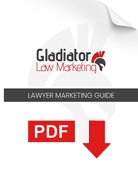

Marketing Guide: Business Lawyers
Marketing Ideas for Business Lawyers
Explore proven marketing ideas for Business Lawyers.
Introduction
In this competitive landscape, business lawyers must go beyond conventional practices to stand out and secure a strong client base. One of the most powerful ways to achieve this is through strategic and comprehensive online marketing. This guide delves deep into various strategies for business lawyers to enhance their online visibility, attract a wide range of clients, and establish themselves as credible experts in the field.
II. Building a Robust Online Presence
Your online presence is the cornerstone of your practice in the digital age. It serves as a reflection of your professionalism, expertise, and the essence of your brand. Here’s an in-depth exploration of how business lawyers can build a strong online presence:
The Significance of Your Professional Website
Your website is often the first point of contact between you and potential clients. It’s a digital representation of your law practice, and it should exude professionalism while reflecting your expertise and your unique brand identity. This is how you can ensure your website shines:
Design Excellence:
Your website design should be clean, contemporary, and professional. It should convey an air of credibility and competence. A well-designed website goes a long way in instilling confidence in visitors and encouraging them to seek your legal services.
User Experience and Navigation:
To retain visitors on your site and encourage them to take action, such as contacting you or seeking further information, invest in a user-friendly interface. Implement intuitive navigation, employ clear and compelling call-to-action buttons, and ensure organized menus for quick access to vital information. A smooth user experience is a critical factor in converting visitors into clients.
Visual Aesthetics and Brand Consistency:
Consistency is key when it comes to your website’s visual elements. Stick to your brand’s color scheme, font style, and graphics. A cohesive look reinforces your brand identity and ensures that prospective clients remember your practice.
Mobile Optimization:
The importance of mobile optimization cannot be overstated. In an era where people use smartphones for practically everything, having a mobile-friendly website not only enhances user experience but also improves your search engine rankings. Search engines tend to favor websites optimized for mobile users.
By focusing on these core areas, you can create a robust online platform that not only effectively communicates your expertise but also builds trust, making it more likely that visitors will take that critical step and become your clients.
III. Search Engine Optimization (SEO)
Search Engine Optimization (SEO) is a fundamental tool for enhancing your online visibility. It involves a range of strategies aimed at optimizing your website and its content to improve your position on search engine results pages (SERPs). A higher ranking on SERPs can significantly increase the chances of potential clients discovering your services.
Understanding the importance of SEO is the first step toward leveraging it effectively. SEO plays a pivotal role in connecting business lawyers with potential clients. In today’s digital age, when someone faces legal issues or needs a lawyer, they often turn to search engines for guidance and solutions. By optimizing your website for SEO, you increase the likelihood of your website appearing in the top results, thereby attracting more potential clients.
The Role of Keywords
Keywords are the linchpin of SEO. They are specific terms or phrases that users enter into search engines when looking for information. Keywords can vary depending on your practice area, but as a business lawyer, you’ll be interested in keywords like “business attorney,” “corporate law expert,” “contract law specialist,” and other relevant terms. Here’s how to master the art of keywords:
Keyword Research:
Conduct thorough keyword research to understand what potential clients are searching for. Various tools can help you identify high-impact keywords that relate to your legal services. It’s imperative to stay up to date with current keyword trends and client behaviors.
Strategic Keyword Integration:
Once you’ve identified your target keywords, it’s time to integrate them into your website content, blog posts, and metadata. Strategic placement of these keywords can significantly improve your search engine rankings. However, it’s not just about stuffing your content with keywords; it’s about incorporating them naturally and contextually so that the content remains valuable and readable.
Balancing Act:
While keywords are crucial to SEO, it’s essential to use them judiciously. Keyword stuffing, which refers to the practice of overloading content with keywords, can be detrimental to user experience and your site’s ranking. Search engines prioritize content that is relevant and provides value to users. Overusing keywords can make content seem forced and unhelpful, which can prompt search engines to rank it lower. Striking a balance between using enough keywords to gain the attention of search engines and maintaining high-quality, valuable content is the key to successful SEO.
The Power of Client Reviews
Client reviews are more than just testimonials; they’re a powerful tool for enhancing SEO. Positive reviews serve two significant functions:
Influence on Decision-Making:
Positive reviews can have a substantial impact on the decision-making process of potential clients. They build trust and reassure potential clients about your capabilities and credibility.
SEO Significance:
Positive reviews also signal to search engines that your services are reliable and appreciated, which can improve your local SEO rankings. Therefore, it’s worthwhile to encourage satisfied clients to leave reviews on popular review platforms and to feature these reviews prominently on your website.
The Art of Engagement with Reviews
Engaging with client reviews, whether they are positive or negative, is also crucial for managing your online reputation and boosting SEO. Responding to reviews demonstrates that you value client feedback and are committed to improving your services. This not only enhances your online reputation but also builds trust with potential clients. Moreover, regular engagement with reviews can lead to more reviews and improved visibility on review platforms, further enhancing your SEO.
By implementing a robust SEO strategy that encompasses these elements, you can dramatically improve your online visibility and attract more clients who are actively seeking business legal services.
IV. Mastering Social Media
In an era dominated by social media, business lawyers have the opportunity to use these platforms to expand their online presence, reach a broader audience, and engage directly with potential clients. Creating professional social media profiles on platforms such as Facebook, LinkedIn, Twitter, and Instagram allows business lawyers to showcase their expertise and build credibility.
Here are the keys to ensuring your professional social media presence:
Consistent Branding:
Maintain consistency in branding across all social media platforms. Use the same logo, color scheme, and tone of voice. This helps create a cohesive online identity and reinforces your professional image.
Sharing Informative and Engaging Content:
Social media provides an excellent avenue for sharing informative and engaging content relevant to your target audience. This can encompass a variety of content types, including blog posts, infographics, videos, and industry news. By providing valuable insights and tips related to business law, lawyers can position themselves as subject matter experts and attract potential clients seeking reliable information.
Interacting with Potential Clients:
Social media platforms offer a direct line of communication with potential clients. Business lawyers should actively respond to comments and messages, building trust and rapport with their audience. Prompt and informative responses can set you apart as a lawyer who genuinely cares about helping clients.
Live Q&A Sessions:
Hosting live question-and-answer sessions on platforms like Facebook Live or Instagram Live can be a highly interactive way to engage with potential clients. These sessions allow you to address legal inquiries and showcase your expertise in real time.
Sharing Success Stories:
By highlighting past client successes or case studies, you not only demonstrate your legal prowess but also reassure potential clients that you have a track record of delivering results.
Effective utilization of social media provides business lawyers with an extensive online platform, enabling them to expand their online presence, engage with potential clients, and establish themselves as credible experts in the field.
V. Pay-per-Click Advertising (Google Ads)
Pay-per-Click (PPC) advertising is a dynamic and highly effective strategy for business lawyers to reach their target audience. By employing Google Ads, lawyers can effectively target specific demographics, locations, and user behaviors. Here’s an in-depth exploration of this strategy:
Attracting Potential Clients through Targeted Campaigns
PPC advertising enables you to attract potential clients actively seeking business law services. By employing keyword targeting, geographic filtering, and demographic criteria, you can tailor your ads to reach the ideal audience most likely to convert into clients. Here’s how to maximize the potential of PPC campaigns:
Keyword Targeting:
Research relevant keywords and phrases that potential clients are likely to use in their search queries. By incorporating these keywords into your ad copy, you increase the chances of your ads appearing when users search for business law-related services.
Geographic Targeting:
Specify the geographic locations where you wish to target your ads. If you’re a business lawyer with a local focus, you can set up your campaigns to target users in specific cities, regions, or countries. This ensures that your ads are seen by users who are most likely to engage with your services.
Demographic Filtering:
Segment your audience based on demographic information such as age, gender, income, and more. This allows you to craft ads that are tailored to the specific characteristics of your ideal clients, making your campaigns more effective.
Crafting Engaging Ads for PPC Campaigns
Compelling ad copy is pivotal to the success of your PPC campaigns. You need to highlight your expertise, unique value proposition, and a clear call to action. Here’s how to craft engaging PPC ads:
Emphasize Expertise: Make sure your ads convey your expertise in business law. Highlight any specializations or areas of excellence that set you apart from competitors.
Unique Selling Proposition (USP):
Your USP is what distinguishes you from other business lawyers. Whether it’s a unique approach, exceptional client service, or a history of successful cases, your USP should be at the forefront of your ad copy.
Clear Calls to Action (CTAs):
Include a prominent and clear CTA in your ad. Whether it’s “Contact Us,” “Schedule a Consultation,” or another action, ensure that it guides users on the next steps to engage with your services.
Regular Monitoring and Optimization
PPC campaigns are not a “set and forget” strategy. To ensure optimal performance and cost-effectiveness, it’s crucial to regularly monitor and optimize your campaigns. Here’s how to do it effectively:
Key Metrics:
Keep a close eye on essential metrics like Click-Through Rate (CTR), Conversion Rate, Cost-Per-Click (CPC), and Quality Score. These metrics provide insights into the performance of your campaigns.
A/B Testing:
Conduct A/B tests to compare different ad creatives, headlines, and CTAs. This allows you to refine your ads for better performance.
Budget Management:
Manage your budget effectively to maximize your ROI. Adjust your spending based on the performance of specific campaigns, keywords, or demographics.
By optimizing your PPC campaigns and continuously refining your approach, you can significantly enhance your online visibility and attract potential clients who are actively searching for business law services.
VI. Building a Robust Referral Network
A robust referral network can be a game-changer for business lawyers. When you have a network of professionals and individuals who trust your legal expertise, it can lead to a steady stream of referrals. Building a referral network involves strategic connections and trust-building. Here’s a deep dive into this crucial aspect of business development:
Forming Relationships with Fellow Lawyers
Collaboration with other lawyers, especially those in complementary practice areas, can be mutually beneficial. By forming relationships with lawyers who handle different aspects of the law, you can refer clients to one another when the need arises.
Here’s how to build these relationships:
Seek Collaborative Opportunities:
Attend legal events, seminars, or networking gatherings to meet fellow lawyers. Look for opportunities to collaborate on cases or projects where your expertise complements each other’s.
Establish Referral Agreements:
Formalize referral agreements with lawyers you trust. These agreements outline the terms of the referral relationship, such as how fees are split or when referrals are appropriate.
Maintain Communication:
Regularly communicate with your legal peers, not only when you have a referral to send but also to stay updated on industry trends, share knowledge, and provide support when needed.
Connect with Financial Professionals
Financial professionals, such as accountants and financial advisors, often work closely with businesses. These professionals can be valuable sources of referrals for business lawyers, especially in cases involving financial distress or complex transactions. Building connections with financial experts can be a significant asset to your practice.
Here’s how to establish these connections:
Networking with Financial Professionals:
Attend networking events that cater to financial professionals. Such events provide an ideal platform to meet accountants, financial advisors, and other experts in the field.
Educational Workshops:
Consider hosting educational workshops or seminars in collaboration with financial professionals. These events can attract business owners and entrepreneurs who might require legal and financial advice.
Offer Expertise:
Demonstrate your expertise to financial professionals by providing insights and guidance on legal matters affecting their clients. Building their trust in your abilities can lead to referrals.
VII. The Power of Content Marketing
Content marketing is a multifaceted strategy that, when executed effectively, can significantly enhance your online visibility and credibility as a business lawyer. By providing valuable and informative content, you can position yourself as a trusted source of legal information and draw potential clients to your website.
In the context of content marketing for business lawyers, “content” refers to any written, visual, or audio material you produce to inform and educate your audience. This content should be relevant to your practice areas, addressing common legal issues, industry updates, and client concerns.
Here’s why legal content is essential:
Positioning Yourself as an Expert:
High-quality content showcases your expertise and knowledge of the law. When potential clients see that you’re well-versed in the legal matters that concern them, they’re more likely to trust your services.
Educating Your Audience:
Content marketing is an educational tool. By providing valuable information, you empower your audience to make informed decisions about their legal needs. This builds trust and positions you as a resource.
Improving Search Engine Rankings:
Search engines prioritize valuable, informative content. When your content addresses common legal questions and issues, it can improve your SEO, increasing your website’s visibility.
Content Types and Strategies
Content marketing encompasses a wide range of materials, from blog posts and articles to videos, infographics, and podcasts. Here’s how to use various content types effectively:
Blog Posts and Articles:
Consistently publishing blog posts and articles on your website not only keeps your site fresh and engaging but also provides valuable information that attracts visitors. Topics can include legal insights, case studies, industry news, and answers to common legal questions.
Videos:
Video content is highly engaging and can be used to explain complex legal concepts, showcase your expertise, or provide commentary on current legal events.
Infographics:
Infographics condense complex information into easily digestible visual formats. They are perfect for explaining processes, summarizing legal steps, and providing quick reference guides.
Podcasts:
Hosting a legal podcast allows you to engage your audience with audio content. You can invite guest experts, discuss legal trends, and answer common legal questions.
E-books and Whitepapers:
Comprehensive resources like e-books and whitepapers demonstrate your authority on specific legal topics. These can be used as lead magnets to collect contact information from potential clients.
The Art of Consistency
Regularly publishing content not only keeps your audience engaged but also signals to search engines that your website is an active and valuable resource. Create a content calendar and stick to a schedule that you can manage consistently.
Promoting Your Content
Creating excellent content is just one part of the equation. You must also promote your content effectively. Here’s how to ensure your content reaches a broader audience:
Leverage Social Media:
Share your content on social media platforms to reach your followers and encourage them to share it with their networks.
Email Marketing:
Send your content to your email subscribers. Encourage them to share it and provide feedback.
Collaboration:
Partner with other professionals, such as accountants or financial advisors, to co-create and share content.
Guest Posting:
Write articles or blog posts for other reputable websites, including legal publications and industry blogs. This can broaden your audience and establish you as an authority in your field.
Monitoring and Measuring Results
Track the performance of your content marketing efforts by monitoring key metrics such as website traffic, engagement, and conversions. Use tools like Google Analytics to gain insights into which types of content resonate most with your audience.
VIII. Online Legal Directories and Listings
Online legal directories and listings are valuable assets for business lawyers seeking to enhance their online visibility. Being listed in these directories increases your chances of being discovered by potential clients searching for legal services.
Here’s how to make the most of legal directories:
Choose the Right Directories
Not all legal directories are created equal. Some directories are more reputable and widely used than others. Focus on getting listed in directories that cater to your practice area and geographic location. Consider some of the following options:
Avvo:
A widely recognized legal directory that allows lawyers to create detailed profiles.
FindLaw:
A comprehensive legal directory that provides various resources for lawyers and potential clients.
Martindale-Hubbell:
Known for its peer and client reviews, this directory offers in-depth lawyer profiles.
Lawyers.com:
A resource that provides lawyer profiles and legal guides for potential clients.
State and Local Bar Associations:
Many state and local bar associations have their own directories. Being listed in these directories can enhance your credibility within your specific legal community.
Google Business Profile:
Claiming and optimizing your Google Business Profile listing is essential for local SEO. It ensures that your practice appears in local search results.
Optimize Your Profiles
Once you’ve chosen the directories you want to be listed in, it’s crucial to optimize your profiles to make the most of them. Here’s how to do it:
Complete All Sections: Fill out all sections of your directory profiles, providing comprehensive information about your practice, services, and expertise.
Use Keywords: Incorporate relevant keywords into your profiles to improve your visibility on the directories and in search engine results.
Include Contact Information: Make sure your contact information, including your law firm’s name, address, phone number, and website, is accurate and up to date.
Upload a Professional Photo: Including a professional photo of yourself adds a personal touch to your profile, making it more appealing to potential clients.
Ask for Reviews: Encourage satisfied clients to leave reviews on your directory profiles. Positive reviews can improve your credibility and attract more clients.
Regularly Update Your Information: Directories are dynamic platforms that require regular updates to maintain their accuracy and effectiveness. Periodically review and update your directory profiles to ensure they reflect any changes in your practice.
IX. Email Marketing
Email marketing is a potent tool for business lawyers to connect with their audience, deliver valuable content, and nurture client relationships. Here’s how to make email marketing work for your practice:
Build a Subscribers List:
Begin by building an email subscribers list. This list should include past and current clients, website visitors, and individuals who have shown interest in your legal services. Here’s how to grow your list:
Website Sign-Up Forms:
Include sign-up forms on your website, allowing visitors to subscribe to your updates and newsletters.
Client Outreach:
Reach out to past and current clients and ask for their permission to add them to your email list.
Networking Events:
Collect business cards or contact information from individuals you meet at networking events and industry gatherings. Always seek explicit consent to add them to your email list.
Content Offerings:
Use content such as e-books, whitepapers, or legal guides as incentives for individuals to subscribe to your email list.
Create Valuable Content
Your email campaigns should offer valuable content that is relevant to your subscribers. Consider the following types of content:
Educational Newsletters: Share insights on recent legal developments, case studies, and legal tips.
Event Invitations: Inform subscribers about legal seminars, workshops, or webinars you’ll be hosting.
Client Success Stories: Showcase successful cases or clients you’ve helped.
Legal Updates: Keep your subscribers informed about changes in relevant laws and regulations that may affect their businesses.
Personalize and Segment
Segmenting your email list allows you to tailor your messages to specific groups within your subscriber base. For example, you can segment your list by practice area, industry, or location, ensuring that each group receives content that’s most relevant to them.
Monitor and Analyze
Pay attention to email open rates, click-through rates, and other key performance indicators. Use this data to refine your email marketing strategy and provide more of the content your subscribers find valuable.
Compliance with Email Regulations
Ensure your email marketing practices comply with relevant regulations, such as the CAN-SPAM Act in the United States. This includes providing an easy way for subscribers to opt out of your emails and honoring those requests promptly.
X. Conclusion
Marketing a law firm may seem challenging initially, but adopting the strategies discussed, such as leveraging social media, utilizing advertising platforms, hosting webinars, and optimizing your website for mobile devices, can form the backbone of a robust marketing strategy. This will significantly enhance your chances of attracting potential clients and establishing your authority in the field.
Remember, building a successful marketing strategy necessitates time and commitment. While results may not be instantaneous, with perseverance and consistent effort, the fruits of your marketing endeavors will become evident.
In conclusion, maximizing online visibility for business lawyers involves a strategic and comprehensive approach. By combining professional website development, effective SEO strategies, social media leverage, pay-per-click advertising, robust referral networks, content marketing, online legal directory optimization, and email marketing, business lawyers can extend their reach and draw in a diverse client base.
Surviving in the highly competitive legal landscape often depends on your ability to position yourself as a credible expert while offering valuable resources and assistance to potential clients. This guide serves as a roadmap, providing insights, strategies, and tactics to enhance online visibility, build strong client relationships, and thrive in the digital age. With continuous dedication and adaptability, business lawyers can become trusted advisors in the ever-evolving world of business law. Remember, the digital landscape is always changing, and your willingness to embrace new technologies and approaches is key to your long-term success.
Learn how to identify and effectively target the market for Business Law Firms.
Need help with marketing ideas for your law firm? Contact the Gladiator Law Marketing team. For over 10 years we have been helping business law firms grow with actionable, data-driven marketing strategies. Our track record speaks for itself, with a remarkable 95% client retention rate. From award-winning websites to high-ROI SEO, PPC and Social Media campaigns, Gladiator Law Marketing can help your law firm stand out in a crowded marketplace. Contact us at 888-683-3212.




